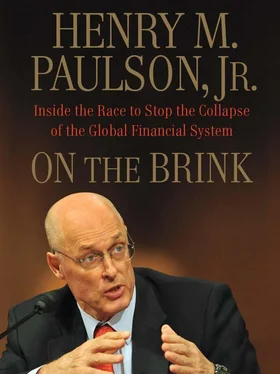“Fannie Mae and Freddie Mac play a central role in our housing finance system and must continue to do so in their current form as shareholder-owned companies,” I said, emphasizing that their “continued strength is important to maintaining confidence and stability in our financial system and our financial markets.”
I announced that President Bush had authorized me to work with Congress on a plan for immediate action, and that after consulting with other officials and congressional leaders, I would ask lawmakers for temporary authority to increase the GSEs’ $2.25 billion line of credit with Treasury and allow us to buy equity in the GSEs if we deemed it necessary.
We would also seek to give the Federal Reserve a role as a consultative regulator. Doing so, I knew, would give the Fed access to all financial information available to the GSEs’ new regulator, the soon-to-be-created Federal Housing Finance Agency, as well as a role in setting capital requirements. Crucially, the FHFA would have more flexibility to make judgments about capital adequacy and the power to place the GSEs in receivership. I had no sooner finished speaking than a downpour erupted.
I had been unable to reach Senator Dodd over the weekend. On Monday I heard he was scheduling a hearing for the following day, and I was mildly offended that he had not discussed this with me first. At that point, I considered congressional hearings to be a waste of time. I’d never seen any piece of legislation get done there, never saw any compromise get worked out at a hearing. I only saw politicians making statements meant to be seen back home.
“This is a crisis,” I told Dodd on the phone. “How are we going to resolve this in a hearing? All we’ll do is spook the markets.”
“Trust me, Hank. We’re going to use the hearings to build support and to build market confidence.”
It turned out we were both correct. There was no way something this big could have passed the Senate without a hearing. But the hearing sure didn’t help the markets.
The response on the Hill to our proposed legislation ranged from skeptical to hostile. The GSEs had plenty of friends in Congress. Many lawmakers didn’t believe we needed new powers, while others didn’t like putting the government behind those agencies. The tax committees objected because our request for unlimited authority to purchase securities and buy equity would require the federal debt limit to be waived; that had to be worked out with House Ways and Means chairman Charlie Rangel.
Richard Shelby’s and Barney Frank’s people assured us that they wouldn’t let the GSEs fail, but the battle lines were drawn. Dodd wanted more foreclosure relief, and House Democrats were adamant about the block grants.
Even as they teetered, the GSEs still had remarkable influence. We wanted to buy equity on the open market if need be, but the GSEs persuaded Dodd to write the language in such a way that we had to get their consent first.
Before the Tuesday morning Senate Banking Committee hearing, Kevin Fromer and Michele Davis, assistant secretary for public affairs and director of policy planning, pounded me about what I should say—and, even more important, what I should not say. They agreed that I was right to emphasize the importance of GSEs to the availability and cost of mortgage financing and to helping homeowners stay in their homes or purchase new ones. “But Hank,” Michele said, “you can’t say that the GSEs are ‘orders of magnitude’ more important than HOPE for Homeowners.” Angry Republicans opposed to HOPE for Homeowners might conclude the president and I would accept anything to get emergency legislation and GSE reform. I left for the Hill determined to bite my tongue.
Before the Senate Banking Committee, Ben Bernanke and I stressed the need to strengthen the weak housing market. I maintained that the bigger and broader our powers, the less likely we would be to use them and the less it would cost taxpayers.
“If you want to make sure it’s used, make it small enough and it’ll be a self-fulfilling prophecy,” I said. Then I uttered the words that would come back to haunt me within a matter of months: “If you’ve got a squirt gun in your pocket, you may have to take it out. If you’ve got a bazooka, and people know you’ve got it, you may not have to take it out. By having something that is unspecified, it will increase confidence, and by increasing confidence it will greatly reduce the likelihood it will ever be used.”
Kentucky Republican Jim Bunning was far from convinced, declaring that “the Fed’s purchase of Bear Stearns’ assets was amateur socialism compared to this.” He asserted that “every time we propose and do something, it always gets used. And you want an unlimited amount used.”
I had walked into the hearing hoping to reassure investors. But contentious comments by a few senators and the skeptical tone of most of the others had a big impact. By day’s end, Fannie’s shares plunged 27 percent, to $7.07; Freddie’s sank 26 percent, to $5.26.
I spent the next day, Wednesday, July 16, in a grinding marathon of meetings and phone calls. In the afternoon, I met with GOP congressional leaders—Senators Mitch McConnell of Kentucky and Jon Kyl of Arizona, and Representatives John Boehner of Ohio and Roy Blunt of Missouri—in the Oval Office with the president and vice president.
It was an extraordinary meeting. These were the administration’s best friends on the Hill. They, and much of the White House staff, opposed the Democrats’ foreclosure legislation for philosophical reasons. And with elections approaching, they were alert to the rising sentiment among taxpayers against helping delinquent homeowners. But the president understood the seriousness of the GSE emergency, and after they aired their complaints, he said firmly, “We’ve got to get this done.”
It was a tremendous act of political courage. It was as if, in the last days of his administration, the president were suddenly switching sides, supporting Democrats and opposing Republicans on matters that went against the basic principles of his administration. But he was determined to do what was best for the country.
Boehner summed up the strangeness of the moment when he said: “I’m prepared to say something supportive about the urgency of moving a bill; I just won’t vote for it.”
Later I met with the entire House Republican Conference in a basement room at the Capitol. The meeting—my first with the group since becoming Treasury secretary—had been set up to let members blow off steam, but that didn’t make it any more pleasant. That crowded room of angry House Republicans was a preview of what I would later see with the Troubled Assets Relief Program.
One member after another walked up to the microphones. They were irate about both the GSE situation and the proposed foreclosure legislation, and they were understandably upset that the bill’s affordable housing fund could funnel money to anti-GOP activist groups like the Association of Community Organizations for Reform Now (ACORN). I must have listened to eight or ten speeches about that. Over and over I explained how critical the capital markets were to the economy, how important the GSEs were to housing, how we were getting real reform that was going to make a difference.
That caucus meeting showed me just how difficult this legislation was for the House Republicans to stomach. Even if the block grants had not been in the language, a lot of these Republicans wouldn’t have voted for the bill. It was going to take the Democrats to get it passed, which was why Nancy Pelosi could demand the block grants as her pound of flesh.
I went straight from that meeting to the Russell Senate Office Building, where I sat down with Chris Dodd, Richard Shelby, and Spencer Bachus. The issue before us was how to move the legislation.
Читать дальше












